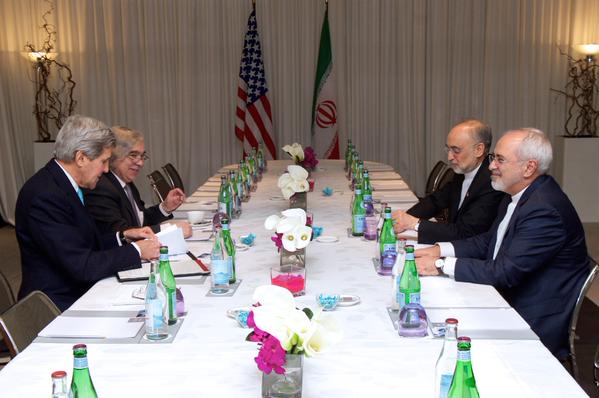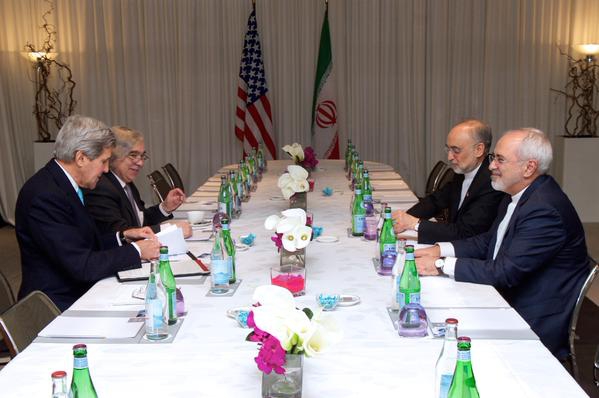 Iran�s Foreign Minister Mohammad Javad Zarif and the head of the Atomic Energy Organization of Iran (AEOI) Ali Akbar Salehi meet with US Secretary of State John Kerry and US Energy Secretary Ernest Moniz in Geneva to discuss Tehran�s nuclear program.[/caption]
Iran�s Foreign Minister Mohammad Javad Zarif and the head of the Atomic Energy Organization of Iran (AEOI) Ali Akbar Salehi meet with US Secretary of State John Kerry and US Energy Secretary Ernest Moniz in Geneva to discuss Tehran�s nuclear program.[/caption](Reuters) - U.S. Secretary of State John Kerry and his Iranian counterpart Mohammad Javad Zarif met for two hours in Geneva on Sunday in another round of nuclear talks to try to narrow gaps as they pressed against a March 31 deadline to reach a political agreement.
The meeting included for the first time U.S. Secretary of Energy Ernest Moniz and Iran's nuclear chief Ali Akbar Salehi, who spent most of the day separately negotiating technical details of curbing Iran's nuclear program.
The talks are set to resume on Monday before Kerry returns to Washington in time to testify before the Senate foreign relations committee on Tuesday on the State Department's 2016 budget request.
Zarif told Iranian state media that mid-level bilateral talks had produced "good discussions but no agreements", and some differences remained.
"The fundamental gap, in my view, is psychological. Some Western countries, the United States in particular, see sanctions as an asset, a lever to exert pressure on Iran. As long as this thinking persists it will be very hard, difficult to reach a settlement."
Zarif said the inclusion of Moniz and Salehi reflected a need "for higher level people with all-embracing command over all issues."
The presence of a close aide and the brother of Iranian President Hassan Rouhani, Hossein Fereydoon, meant better "coordination with the president," he added.
The talks took place behind closed doors with no customary photo opportunity for journalists covering the meetings.
Kerry on Saturday cautioned against reading too much into the presence of Moniz in Geneva, which U.S. officials aid was decided after Iran announced Salahi would attend. "There is still a distance to travel," he told a news conference in London.
The negotiations between Iran and "P5+1" powers - the United States, Britain, Germany,Russia and China - have reached a sensitive stage with divisions remaining, mainly over Iranian uranium enrichment and the pace of removing sanctions.
A recent U.N. report said Iran had refrained from expanding tests of more efficient models of a machine used to refine uranium under a nuclear agreement with the six world powers. Development of advanced centrifuges is feared to lead to material potentially suitable for manufacture of nuclear bombs.
Iran says it does not intend to develop atomic bombs.
Kerry said U.S. President Barack Obama was not inclined to extend the talks again. The parties already missed a November 2014 target date.
Obama believed it was "imperative to be able to come to a fundamental political outline and agreement within the time space that we have left," the secretary of state said.
Zarif said Rouhani would not accept a small, short-term agreement, nor a broad accord that left room for interpretation.
Israeli Prime Minister Benjamin Netanyahu, increasingly critical of U.S. policy, said it was "astonishing" that the talks, which could end by allowing Iran "to develop the nuclear capabilities that threaten our existence", were proceeding.
Any agreement would be "dangerous for Israel, the region and the entire world,"�Netanyahu said on Sunday.
By Reuters











